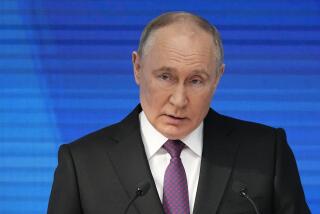Gorbachev Sees Major Peril in Yugoslav Crisis
- Share via
MOSCOW — Soviet President Mikhail S. Gorbachev warned Tuesday that the continuing crisis in Yugoslavia, with the threat of a civil war there, poses a serious danger to surrounding countries, including the Soviet Union, and to the stability of the European Continent.
Gorbachev, concluding two days of talks here with Spanish Prime Minister Felipe Gonzalez, told a press conference that many of the fundamental principles of European security and the “new world order” are at stake in the Yugoslav conflict.
“To say that it affects the Soviet Union is to say nothing--it affects all of us,” Gorbachev said.
“We are looking for ways to resolve the problem by peaceful means, respecting the peoples of Yugoslavia but proceeding from the premise that we favor Yugoslavia’s integrity and are committed to the inviolability of borders.”
Gorbachev warned that, if Europe breaks away from the principle of respecting the present borders, “developments in Europe will be out of control.”
After several bland statements and then some hand-wringing, Moscow dispatched a senior deputy foreign minister, Yuli A. Kvitsinsky, to Yugoslavia late last week as a special envoy to make clear to all parties the Kremlin’s support for the continuation of the Yugoslav federation and its opposition to the secession of Croatia and Slovenia.
In the Soviet view, Gorbachev said, a balance must be struck between the preservation of Yugoslavia as a unified state and full recognition of the rights of its various nationalities.
“We will use our close links with all the people of Yugoslavia to ensure that everything happens within the framework of democracy,” Gorbachev said. “They are a fraternal people to us, and we are united by many things, recent and more distant history. . . .”
In Gorbachev’s mind, however, was not only the threat that Yugoslavia’s breakup might pose to European stability but also the precedent that it could set for the Soviet Union, where the three Baltic republics of Estonia, Latvia and Lithuania have declared their independence and two or three other republics may follow.
“Our republics are following events in Yugoslavia very closely,” Gorbachev said. “This is one more lesson that everything (in the Soviet Union) must be resolved within the framework of reforming our federation, on the basis of the results of the (national referendum in March) that preserved and renewed our great union of peoples.”
More to Read
Sign up for Essential California
The most important California stories and recommendations in your inbox every morning.
You may occasionally receive promotional content from the Los Angeles Times.













